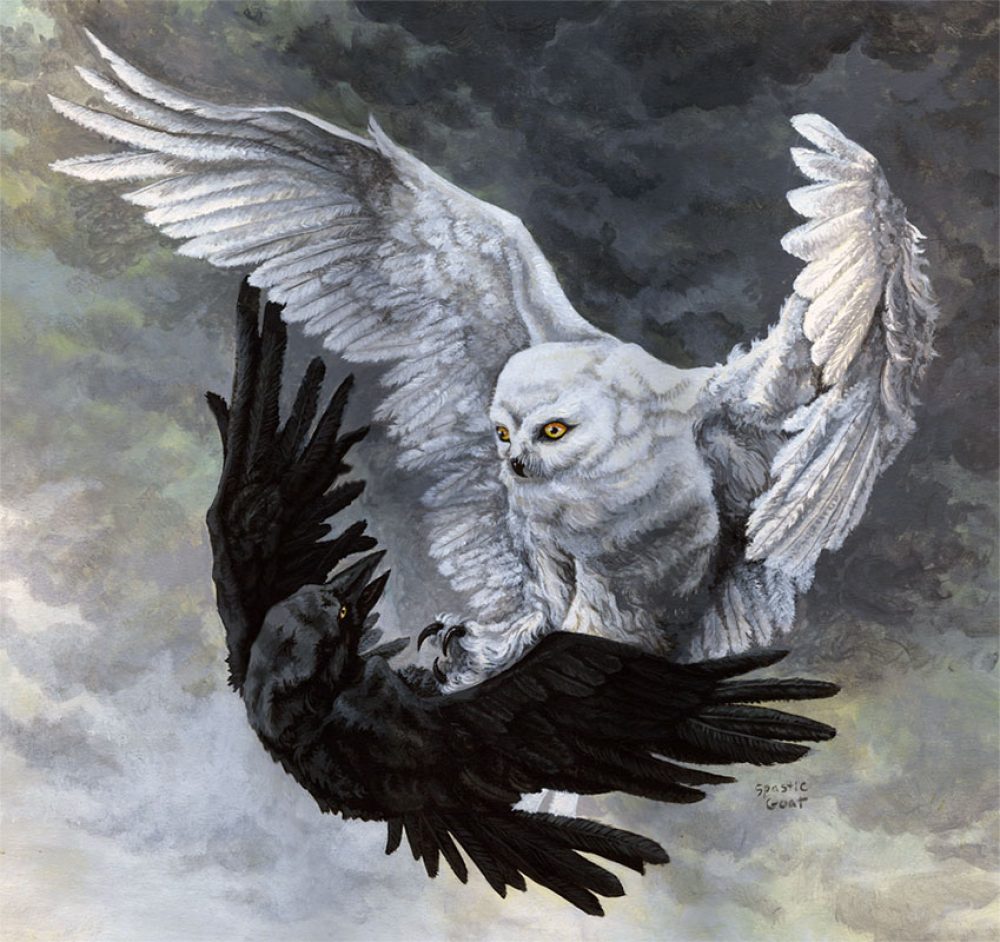Read the previous part here…
Sthirajeevin looked at MeghaVarna and smiled. “My son, your ministers are capable, and have given you the proper advice – such advice is useful provided the circumstances are such. However, the current situation is very different. We cannot take this lightly – our very existence is at stake. “

“And so it is time for Dvaidhibhava – duplicity.”
Dvaidhibhava is one of the six strategies of foreign policy that was advocated by Chanakya. It can be understood as ‘double dealing’, or ‘duplicity’ – keeping apparently friendly relations with the enemy while plotting to defeat him by weakening him from the inside.
Dvaidhibhava also refers to the double policy of Sandhi with one king and Vigraha with another at the same time. It is suggested for a King who is strong enough to fight but may not win without getting additional strength of an ally.
Sthirajeevin was a very wise minister. He knew that the owls were very deceptive, and besides, the crows did not even know where their enemies fort was located. Even if they managed to fight off an owl or two, in the long-term, all strategies would fail to deliver the peace that they were looking for. The only option was to finish off the enemy, once and for all.
Let’s go back to see what Sthirajeevin recommends…
अविश्वासं सदा तिष्ठेत् सन्धिना विग्रहेण च ।
द्वैधी-भावं समाश्रित्य पापे शत्रौ बलीयसि ॥ ६१ ॥
aviśvāsaṃ sadā tiṣṭhet sandhinā vigraheṇa ca |
dvaidhī-bhāvaṃ samāśritya pāpe śatrau balīyasi || 61 ||
One should not trust an enemy that is wicked and powerful. Dvaidhibhava should be adopted – make a pretence of friendship or peace, and secretly continue to plot and prepare for war.
“You should not trust anyone but yourself…however, make the enemy trust you though your actions. Once he trusts you, you can destroy him easily. उच्छेद्यम् अपि विद्वांसो वर्धयन्त्य् अरिम् एकदा – the wise allow the enemy to go ahead, to thrive a little, even though they want to destroy him. Once trust is gained, the move can be made.”
कृत्यं देव-द्विजातीनाम् आत्मनश् च गुरोस् तथा ।
एक-भावेन कर्तव्यं शेषं द्वैध-समाश्रितम् ॥ ६४ ॥
kṛtyaṃ deva-dvijātīnām ātmanaś ca guros tathā |
eka-bhāvena kartavyaṃ śeṣaṃ dvaidha-samāśritam || 64 ||
Work related to God, wise men, the self and the Guru – these should be done in all honesty. For the rest – only dvaidhibhava should be used.
एको भावः सदा शस्तो यतीनां भावितात्मनाम् ।
श्री-लुब्धानां न लोकानां विशेषेण मही-भुजाम् ॥ ६५ ॥
eko bhāvaḥ sadā śasto yatīnāṃ bhāvitātmanām |
śrī-lubdhānāṃ na lokānāṃ viśeṣeṇa mahī-bhujām || 65 ||
Only saints and sages have the need to remain honest at all times. Kings who are greedy for wealth and power should not adopt total honesty.
“And so MeghaVarna, adopt the policy of dvaidhibhava. You will, from the security of your own fort, be able to take advantage of the greed of the enemy, and win over him. You can also find out his weaknesses and destroy him.”
MeghaVarna replied “Oh revered Sthirajeevin, we don’t even know where our enemy lives. How can we know his weaknesses?”
Sthirajeevin smiled. “That is what our spies are for, MeghaVarna. Not just where he lives, we will also find out all his weaknesses. It is said…
गावो गन्धेन पश्यन्ति वेदैः पश्यन्ति वै द्विजाः ।
चारै पश्यन्ति राजानश् चक्षुर्भ्याम् इतरे जनाः ॥ ६६ ॥
gāvo gandhena paśyanti vedaiḥ paśyanti vai dvijāḥ |
cārai paśyanti rājānaś cakṣurbhyām itare janāḥ || 66 ||
Animals ‘see’ though their sense of smell, the wise ‘see’ through their knowledge of the scriptures. Kings ‘see’ through their spies, and ordinary people see through just their own eyes.
MeghaVarna thought for a while, and then said “Oh revered Sthirajeevin, I understand what you have said. But I have a question – how did this enmity arise in the first place? Why are crows and owls such bitter enemies, that they are ready to kill each other?”
Sthirajeevin sat back, sipped some water, and wiped his beak. He then took a deep breath, and said…
to be continued…
